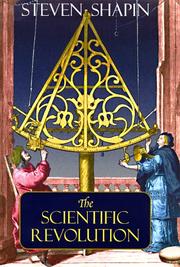Check nearby libraries
Buy this book

Rejecting the notion that there is anything like an "essence" of early modern science, Shapin emphasizes the social practices by which scientific knowledge was produced and the social purposes for which it was intended. He shows how the conduct of science emerged from a wide array of early modern philosophical agendas, political commitments, and religious beliefs. And he treats science not as a set of disembodied ideas, but as historically situated ways of knowing and doing.
Shapin argues against traditional views that represent the Scientific Revolution as a coherent, cataclysmic, and once-and-for-all event. Every tendency that has customarily been identified as its modernizing essence was contested by sixteenth- and seventeenth-century practitioners with equal claims to modernity.
Experimentalism was both advocated and rejected; mathematical methods were both celebrated and treated with skepticism; mechanical conceptions of nature were seen both as defining proper science and as limited in their intelligibility and application; and the role of experience in making scientific knowledge was treated in radically different ways.
Yet Shapin points to the many ways that contested legacy is nevertheless rightly understood as the origin of modern science, its problems as well as its acknowledged achievements.
Check nearby libraries
Buy this book

Previews available in: English
Subjects
Science, History, open_syllabus_project, Long Now Manual for Civilization, Science -- History, Science, philosophy, Science, history, Science, methodology, New York Times reviewed, Science--history, Q125 .s5166 1996, 509People
Rene Descartes, Issac Newton, Robert Boyle, Francis Bacon, Galileo| Edition | Availability |
|---|---|
| 1 |
zzzz
|
| 2 |
zzzz
|
| 3 |
zzzz
|
| 4 |
zzzz
|
| 5 |
aaaa
|
Book Details
Table of Contents
Edition Notes
Includes bibliographical references and index.
Classifications
The Physical Object
Edition Identifiers
Work Identifiers
Source records
Scriblio MARC recordLibrary of Congress MARC record
Internet Archive item record
Internet Archive item record
Better World Books record
Better World Books record
Library of Congress MARC record
Promise Item
marc_nuls MARC record
ISBNdb
marc_columbia MARC record
marc_columbia MARC record
Work Description
Refines the idea of the Scientific Revolution by taking a closer, culturally informed look at what nature was considered to be, how nature was studied, and to what use the knowledge gained was put.
Links outside Open Library
Community Reviews (0)
| December 19, 2023 | Edited by ImportBot | import existing book |
| August 6, 2021 | Edited by New York Times Bestsellers Bot | Add NYT review links |
| August 4, 2020 | Edited by ImportBot | import existing book |
| January 12, 2019 | Edited by MARC Bot | import existing book |
| December 10, 2009 | Created by WorkBot | add works page |











